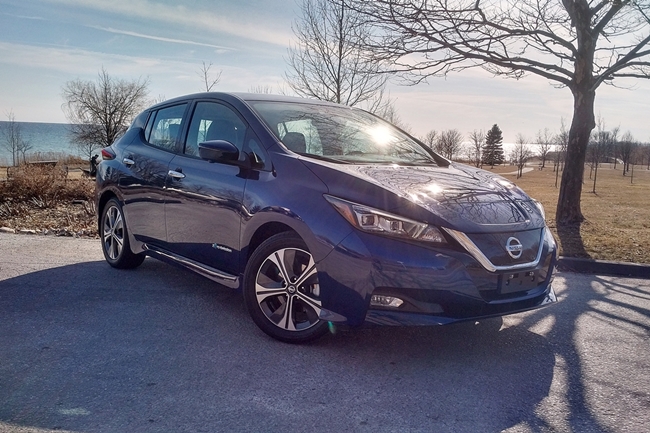When Nissan launched its 2nd generation Leaf EV last year and revealed a driving range of about 240 kilometres (150 miles), there were many who were left disappointed. After all, its perceived main rival, the Chevrolet Bolt EV had a driving range of over 380 kilometres (236 miles), so the significant range disparity was definitely being noticed.
Well that disparity is a disparity no more.
In a press release, Nissan has announced the launch of the Leaf e+ (or Leaf Plus in Canada), a new version of the 2nd generation Leaf that offers both more power and extended range.
The “e+” refers to the increased energy density of the model’s 62 kWh battery pack and the higher output of its powertrain. The new powertrain adds to the car’s range by approximately 40 per cent, with NRCan range of up to 363 kilometres (225 miles), ensuring that there’s a Nissan LEAF to meet the driving needs of a wider range of customers.
“The new Nissan LEAF e+ offers all of the style, convenience and electric vehicle benefits that have helped make LEAF the best-selling electric vehicle in the world, plus even more driving excitement, range, power and choice,” said Denis Le Vot, senior vice president and chairman, Nissan North America. “Customers now have a selection of powertrains and models to best suit their driving needs and budgets.”
The high-capacity battery and more powerful, 160 kW motor in the LEAF e+ combine to produce 45 per cent more power and 250 lb-ft (340 Nm) of torque, enabling faster acceleration when driving at high speeds. Accelerating from 50 mph (80 kph) to 75 mph (120 kph) is nearly 13 per cent quicker. This allows the LEAF e+ to confidently pass slower-moving vehicles, exit corners faster and more seamlessly, and merge easily with fast-moving traffic. The top speed has increased by approximately 10 per cent for comfortable cruising.
SEE ALSO: 2018 NISSAN LEAF FIRST DRIVE REVIEW
SEE ALSO: TESTING THE RANGE OF A 2018 NISSAN LEAF WHILE DAY TRIPPING
Thanks to the available new 70 kW (100 kW peak) Quick Charging system, the 2019 Nissan LEAF e+ can charge more efficiently than ever. Based on early testing, the company estimates that Nissan LEAF e+ owners can expect similar charging times when hooked up to a 100 kW charger as current LEAF owners do with a 50 kW charger, despite a 55 per cent larger battery storage capacity.
Even with a 25 per cent increase in energy density and the increase in energy storage capacity, Nissan says the LEAF e+ battery pack is almost the same size and configuration as the pack in the Nissan LEAF. Other than a 5-millimetre increase in overall height (16-inch wheels), the car’s exterior and interior dimensions are unchanged.
Because ownership satisfaction and peace of mind are pivotal for all Nissan LEAF owners, the battery limited warranty of 8 years/160,000 km (whichever occurs first) is standard for all versions.
New for the LEAF e+ (on North American and EU models) is an available larger, thin-film transistor, full-colour 8-inch display, with an updated navigation system that can be linked to a compatible smartphone. The display features smartphone-like operation including swiping, scrolling and tapping. Applications, maps and firmware are updated over the air with the simple touch of a button, instead of having to manually update by USB or at a Nissan dealership.
Other new available features include Door-to-Door Navigation, which syncs the vehicle’s navigation system with your compatible smartphone for seamless driving and walking directions. The Connections feature allows any of the car’s passengers to quickly and easily connect to a device within the vehicle.
Integration goes beyond what’s in the vehicle and now includes Nissan Energy, the company’s existing and future initiatives for Vehicle-to-Grid, Vehicle-to-Building and Vehicle-to-Home connections, generating solar electricity, as well as reusing batteries. With Nissan Energy, LEAF vehicles are part of a larger electric vehicle ecosystem.
The LEAF e+ carries over most of the LEAF’s design. Subtle clues to its e+ designation include a revised front fascia with blue highlights and an “e+” logo on the Quick Charger cap.
There will also be a rear trim level badge for U.S. and Canada which will be designated as S PLUS, SV PLUS and SL PLUS. The Nissan LEAF PLUS Series is scheduled to join the LEAF at Nissan dealerships in Japan in January 2019. North American sales are expected to begin in spring 2019 and European sales to commence in mid-2019.
Pricing has not been announced and will be released closer to the launch date.
More than 380,000 Nissan LEAF vehicles have been sold globally since the 100 per cent electric model first went on sale in 2010. In Canada, the Nissan LEAF saw a surge in sales, with 5,735 units sold in 2018, four times the previous record year recorded in 2016.
(with files from Nissan Canada)


Leave a Reply